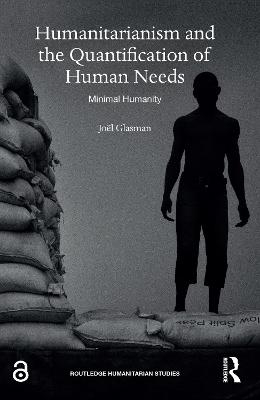
Humanitarianism and the Quantification of Human Needs
Minimal Humanity
Seiten
2019
Routledge (Verlag)
978-0-367-22215-4 (ISBN)
Routledge (Verlag)
978-0-367-22215-4 (ISBN)
This book provides the first historical inquiry into the quantification of needs in humanitarian assistance. Ultimately the book argues that we cannot understand the global humanitarian aid movement, if we do not understand how humanitarian agencies made human suffering commensurable across borders in the first place.
This book provides a historical inquiry into the quantification of needs in humanitarian assistance. Needs are increasingly seen as the lowest common denominator of humanity. Standard definitions of basic needs, however, set a minimalist version of humanity – both in the sense that they are narrow in what they compare, and that they set a low bar for satisfaction. The book argues that we cannot understand humanitarian governance if we do not understand how humanitarian agencies made human suffering commensurable across borders in the first place.
The book identifies four basic elements of needs: As a concept, as a system of classification and triage, as a material apparatus, and as a set of standards. Drawing on a range of archival sources, including the United Nations Refugee Agency (UNHCR), Médecins sans Frontières (MSF), and the Sphere Project, the book traces the concept of needs from its emergence in the 1960s right through to the present day, and United Nations Secretary-General Ban Ki-moon’s call for “evidence-based humanitarianism.” Finally, the book assesses how the international governmentality of needs has played out in a recent humanitarian crisis, drawing on field research on Central African refugees in the Cameroonian borderland in 2014–2016.
This important historical inquiry into the universal nature of human suffering will be an important read for humanitarian researchers and practitioners, as well as readers with an interest in international history and development.
The Introduction, Conclusion, and Chapers 1, 4, 5, and 6 of this book are freely available as downloadable Open Access PDFs at http://www.taylorfrancis.com under a Creative Commons Attribution-Non Commercial-No Derivatives (CC-BY-NC-ND) 4.0 license.
This book provides a historical inquiry into the quantification of needs in humanitarian assistance. Needs are increasingly seen as the lowest common denominator of humanity. Standard definitions of basic needs, however, set a minimalist version of humanity – both in the sense that they are narrow in what they compare, and that they set a low bar for satisfaction. The book argues that we cannot understand humanitarian governance if we do not understand how humanitarian agencies made human suffering commensurable across borders in the first place.
The book identifies four basic elements of needs: As a concept, as a system of classification and triage, as a material apparatus, and as a set of standards. Drawing on a range of archival sources, including the United Nations Refugee Agency (UNHCR), Médecins sans Frontières (MSF), and the Sphere Project, the book traces the concept of needs from its emergence in the 1960s right through to the present day, and United Nations Secretary-General Ban Ki-moon’s call for “evidence-based humanitarianism.” Finally, the book assesses how the international governmentality of needs has played out in a recent humanitarian crisis, drawing on field research on Central African refugees in the Cameroonian borderland in 2014–2016.
This important historical inquiry into the universal nature of human suffering will be an important read for humanitarian researchers and practitioners, as well as readers with an interest in international history and development.
The Introduction, Conclusion, and Chapers 1, 4, 5, and 6 of this book are freely available as downloadable Open Access PDFs at http://www.taylorfrancis.com under a Creative Commons Attribution-Non Commercial-No Derivatives (CC-BY-NC-ND) 4.0 license.
Joël Glasman is Professor of African History at the University of Bayreuth, Germany.
Introduction: Minimal Humanity: The Commensuration of Human Suffering on a Global Scale 1. Concepts. Elements for a genealogy of needology 2. Classifications. UNHCR and the legibility of refugees in Central Africa 3. Measures. Malnutrition, MUAC, and the materialization of anthropometry 4. Standards. The 'Sphere project' and the universalization of the vital minimum after Goma 5. Registration. Refugees and the emergence of a humanitarian field in Cameroun 6. Vulnerability. Impartial algorithms and analog malnutrition Conclusion: Infrastructures of commensurability
| Erscheinungsdatum | 23.12.2019 |
|---|---|
| Reihe/Serie | Routledge Humanitarian Studies |
| Zusatzinfo | 2 Tables, black and white; 10 Line drawings, black and white; 31 Halftones, black and white; 41 Illustrations, black and white |
| Verlagsort | London |
| Sprache | englisch |
| Maße | 156 x 234 mm |
| Gewicht | 453 g |
| Themenwelt | Mathematik / Informatik ► Mathematik ► Finanz- / Wirtschaftsmathematik |
| Naturwissenschaften ► Biologie ► Ökologie / Naturschutz | |
| Sozialwissenschaften ► Politik / Verwaltung | |
| Sozialwissenschaften ► Soziologie ► Spezielle Soziologien | |
| Wirtschaft ► Betriebswirtschaft / Management ► Logistik / Produktion | |
| Wirtschaft ► Betriebswirtschaft / Management ► Marketing / Vertrieb | |
| Wirtschaft ► Betriebswirtschaft / Management ► Unternehmensführung / Management | |
| Wirtschaft ► Volkswirtschaftslehre | |
| ISBN-10 | 0-367-22215-9 / 0367222159 |
| ISBN-13 | 978-0-367-22215-4 / 9780367222154 |
| Zustand | Neuware |
| Haben Sie eine Frage zum Produkt? |
Mehr entdecken
aus dem Bereich
aus dem Bereich
eine anwendungsorientierte Einführung
Buch | Softcover (2023)
Springer Gabler (Verlag)
CHF 69,95
Buch | Softcover (2023)
De Gruyter Oldenbourg (Verlag)
CHF 41,90


